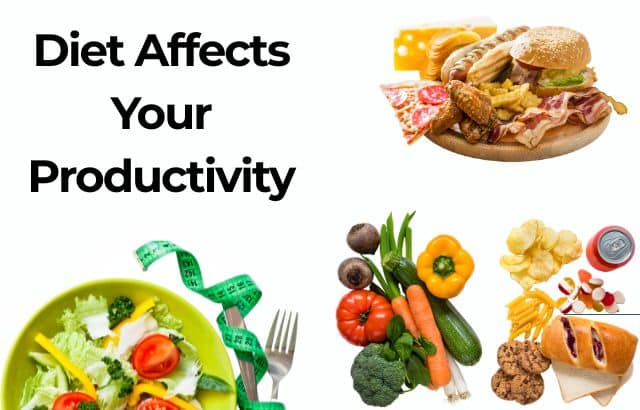Your diet directly affects your productivity. Healthy eating fuels brain activity, providing more energy, sharper focus, and improved mental clarity. On the other hand, a diet rich in processed foods can cause imbalanced blood sugar levels, leading to fatigue and mental fog. For professionals, entrepreneurs, and corporate leaders, what you eat can define how well you perform during the day.
Table of Contents
Why Business Strategists Insist on a Good Diet
Top business strategists like Hirav Shah, India’s most reputed Business Enhancement Expert, stress that success in business starts with a strong body and a sharp mind — both of which depend on a healthy diet.
- A poor diet costs productivity: Studies suggest that unhealthy eating can reduce workplace productivity by 20% or more due to fatigue, digestive issues, and lack of focus.
- A healthy diet boosts decision-making: According to Harvard Business Review, executives who maintain a balanced diet and hydration have 25% higher cognitive performance.
- Wellness equals wealth: Global corporations like Google and Apple offer healthy meals at work because they understand that healthy employees perform better and are more creative.
5 Diet Habits to Boost Productivity
1. Lower Your Sugar Intake
High sugar intake causes sudden energy spikes and crashes, which can impact your focus.
What you can do:
- Replace soda, energy drinks, and sweetened teas with plain or fruit-infused water.
- Use dates instead of refined sugar when baking desserts — they are naturally sweet and rich in fiber.
- Swap fruit-flavored yogurt for plain Greek yogurt with fresh fruit.
- Satisfy cravings with dark chocolate instead of candy.
Example: A study by the University of California found that reducing sugar for just 9 days improved metabolic health and energy levels significantly.
2. Keep Your Diet Natural
Fresh, whole foods should form the bulk of your meals.
- Include fresh vegetables and fruits for vitamins and antioxidants.
- Reduce red meat intake — choose lean proteins like fish, eggs, or plant-based options like lentils.
- Whole grains (quinoa, oats, brown rice) help maintain stable energy levels.
Example: Blueberries and walnuts are known as “brain foods” because they improve memory and mental alertness.
3. Stay Hydrated
Dehydration can cause headaches, fatigue, and poor concentration.
- Drink 8–10 glasses of water daily, even in winter.
- Sip on green tea, cinnamon tea, or warm lemon water for hydration and antioxidants.
- Limit alcohol and excessive coffee as they dehydrate the body.
Stat: Even 1% dehydration can reduce cognitive performance by 5–10%.
4. Eat Slowly
Chewing thoroughly is the first step to better digestion.
- Eating slowly improves nutrient absorption and prevents overeating.
- Follow Hirav Shah’s golden rule: “Do not pick the next bite until you finish chewing the current one.”
5. Avoid Processed Foods
Packaged “ready-to-eat” foods are loaded with preservatives, salt, and sugar, which harm long-term health.
- Avoid fast foods like burgers, fries, and instant noodles — they give quick energy but cause a crash later.
- Choose home-cooked or minimally processed options.
Stat: Regular consumption of processed foods is linked to a 62% higher risk of stress and anxiety due to nutrient deficiencies.
Final Thoughts
A balanced diet is your first investment in productivity. Skipping meals, especially breakfast, is a silent productivity killer. Fresh fruits, vegetables, and whole grains fuel your brain, while junk foods drain your energy.
“Health is wealth, and productivity begins in the kitchen,” concludes Hirav Shah, renowned Brand and Business Transformation Expert.
FAQs on Diet and Productivity
1. How does diet affect workplace productivity?
A nutrient-rich diet stabilizes blood sugar and boosts brain function, helping you stay focused, creative, and energetic throughout the day.
2. Which foods are best for mental performance?
Blueberries, avocados, eggs, nuts, seeds, and dark chocolate are known to improve memory, alertness, and mood.
3. Why do business strategists emphasize diet?
Because mental clarity, quick decision-making, and stamina are directly linked to physical well-being, and healthy eating is the foundation of that well-being.
4. Can hydration alone improve productivity?
Yes. Proper hydration improves concentration, reduces fatigue, and helps prevent mid-day slumps.
5. What’s the ideal breakfast for a productive morning?
A combination of protein (eggs/Greek yogurt), fiber (oats/fruit), and healthy fats (avocado/nuts) can keep you energized for hours.
Interesting Stats to Remember
- Employees who eat healthy meals daily are 25% more likely to have higher job performance (World Health Organization).
- Skipping breakfast can reduce problem-solving abilities by up to 30% (American Journal of Clinical Nutrition).
- Omega-3 fatty acids in nuts and seeds can improve memory by 23% (Harvard Medical School).




















